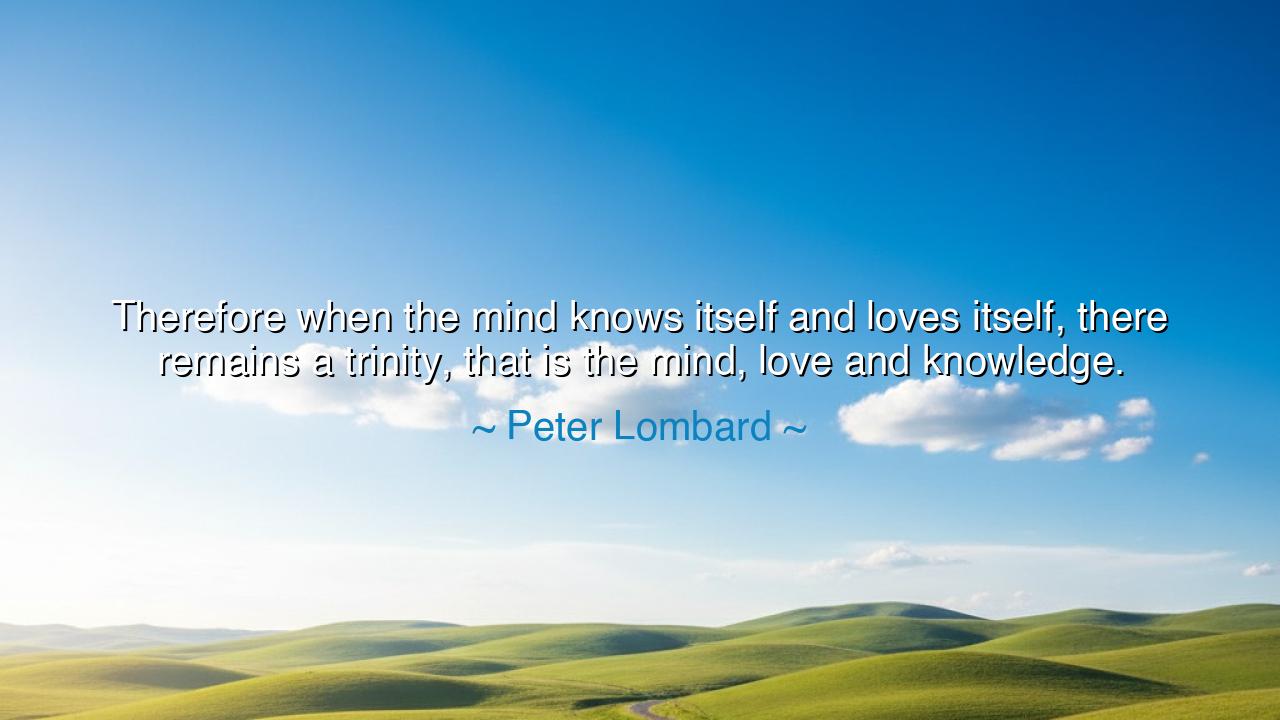
Therefore when the mind knows itself and loves itself, there
Therefore when the mind knows itself and loves itself, there remains a trinity, that is the mind, love and knowledge.






The great theologian Peter Lombard, in his meditations on divine truth, once declared: “Therefore when the mind knows itself and loves itself, there remains a trinity, that is the mind, love and knowledge.” In these words, he speaks not of arithmetic nor of philosophy alone, but of the eternal mystery within the human soul — the reflection of the Divine Trinity in the structure of the human mind. To Lombard, the mind was not a mere vessel for thought, but a mirror of the Creator Himself. When the mind knows itself, and when it also loves itself rightly, it gives birth to a sacred harmony between thought, affection, and being — a trinity within us that echoes the image of God.
In the age of Peter Lombard, the twelfth century, the world of faith and intellect was awakening to a grand synthesis — a time when scholars sought to unite reason and revelation. Lombard, known as the “Master of Sentences,” sought to explain the mysteries of theology through logic and contemplation. Yet, in this quote, he stepped beyond scholastic argument to touch the heart of spiritual psychology. He tells us that the human mind, made in the image of God, possesses within itself a reflection of divine unity: the power to know, the power to love, and the essence that binds the two. To understand oneself is to begin the path of wisdom; to love oneself — not with pride, but with reverence — is to continue it. When these two forces meet, they create balance, a trinity that brings peace to the soul.
To know oneself is not merely to recite one’s name or recall one’s deeds, but to stand naked before truth — to perceive one’s motives, fears, and potential. The ancient sages of Greece spoke of this in the inscription at Delphi: “Know thyself.” Lombard builds upon that command, adding the sacred dimension of love. Knowledge without love is cold and sterile; love without knowledge is blind and reckless. But when the mind truly sees itself — its strengths, its weaknesses, its divine spark — and loves itself as part of the eternal order, it becomes whole. This is the trinity of being within man: knowledge that enlightens, love that warms, and the mind that holds them both in unity.
There is a story of Saint Augustine, whose influence guided Lombard’s own thought. Augustine once looked upon the human soul as the image of God — a reflection of the Father, Son, and Holy Spirit. He wrote that the mind, when it remembers, understands, and loves, participates in the divine pattern of creation. Lombard took this further: he showed that such divine resemblance is not abstract, but living — that when the soul loves itself in truth, not vanity, it becomes a microcosm of heaven. The human spirit thus bears within it the seed of divinity, not by power or possession, but by harmony — the harmony of mind, knowledge, and love.
In this trinity, knowledge represents clarity — the light by which the mind sees truth. Love represents warmth — the force by which the mind clings to what is good. And the mind itself is the vessel that holds both. If knowledge is the eye, love is the heartbeat, and the mind is the living soul that unites them. Lombard’s wisdom teaches us that these three must dwell together. A mind filled with knowledge but empty of love becomes arrogant; a mind filled with love but empty of knowledge becomes naïve; but a mind that knows and loves in harmony becomes divine.
Look at the life of Leonardo da Vinci, a man of both science and wonder. He sought to understand the world — the flight of birds, the anatomy of man, the play of light upon water. Yet what made his genius radiant was not intellect alone, but his reverence for life. He did not dissect to destroy, but to understand the beauty of creation. In him, the mind, knowledge, and love worked together in sacred balance. This is the living example of Lombard’s trinity: a man whose thought was clear, whose heart was full, and whose soul was whole.
The lesson, then, is not merely theological — it is deeply human. Each of us must seek to know ourselves truthfully and to love ourselves faithfully. For when the mind rejects self-knowledge, it drifts into ignorance; and when it rejects self-love, it falls into despair. The union of the two gives rise to wisdom. It teaches us compassion for others, for to love oneself rightly is to understand the frailty and beauty of all souls. The trinity of mind, love, and knowledge becomes not only a mirror of God, but a guide to living well in the world.
So remember, O seeker: the divine does not dwell only in the heavens, but also within the mind that knows itself, within the heart that loves itself, and within the harmony that arises between them. To cultivate this trinity is to walk the path of balance, to live with wisdom and mercy, and to reflect, even in mortal form, the eternal light of creation itself.






AAdministratorAdministrator
Welcome, honored guests. Please leave a comment, we will respond soon